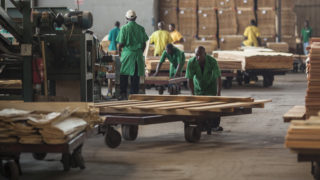
Promoting Legal Timber Markets: the Role of Public Procurement Policies in the Tropics
What progress is being made across Africa and Latin America to promote the trade in legal timber?
Unprecedented global trade disruptions resulting from the COVID-19 pandemic have reminded us of the key role of domestic markets in sustaining livelihoods. In fact, by promoting the demand and supply of legal timber on the domestic market, public procurement policies can not only be critical to sustainable forest management but can also provide long-term economic opportunities to people who depend on the timber trade.
Public procurement plays an important role in the economies of tropical countries and often accounts for a large share of the domestic market for timber. It is a crucial pillar for governments and affects the livelihoods of citizens in everything from energy efficiency to healthcare. Indeed, because of the sheer volume of the spending it represents, well-governed public procurement plays a major role in fostering public sector efficiency.
Governments are also increasingly using public procurement as a strategic tool for achieving policy goals such as environmental protection, innovation, job creation and the development of small and medium enterprises.
Furthermore, public procurement policies, if functioning correctly, can reduce the amount of illegal and unsustainable timber purchased by governments thereby having broader implications on the timber market.
Indeed, research suggests that such knock-on impacts can achieve market leverage of up to 25 per cent. Establishing legality criteria for the purchase of timber can therefore have a significant impact on the forest sector and thereby help to support legal and sustainable timber production and trade.
In Cote D’Ivoire, the government’s use of timber represents 5 to 20 per cent of overall government procurement. Recent efforts to promote the production and trade of legally harvested timber on the domestic market include a nation-wide study intended to fill the knowledge gap on the type and volume of timber supplied to the domestic market.
Importantly, the study quantifies the demand for timber and presents recommendations to increase the supply of legal timber in the country. The findings of the study have subsequently fed into a draft public procurement policy and a related workplan which was discussed with stakeholders in December 2020 and is likely to be submitted to the government in the first of quarter of 2021.
The proposed policy also sets a framework for the use and supply of legal timber in the context of public procurement, including definitions of legal timber and its sources, and it is also accompanied by a draft white paper to orient future integration of domestic markets into the country’s Voluntary Partnership Agreement (VPA) being negotiated with the EU.
In Cameroon, only 27 per cent of the timber circulating in the country’s major urban markets in 2016 was found to be legal while the government consumes an estimated 13,000 cubic meters of timber per year for the renovation of public infrastructure alone.
Similarly to other countries in the region, the supply of legal timber on the market has been identified as one of the main challenges. To address this, Cameroon’s Ministry of Forestry has recently developed an online marketing platform with information about species, volume, technical and commercial specifications of legally produced timber.
In addition, the Ministries of Forestry and Fauna, Public Works and Public Procurement have joined forces and issued a public procurement policy in December 2020 which requires the use of legally sourced timber in public tenders.
The decree outlines measures to be taken by the Ministry of Forest and Fauna to increase the availability of legal timber in the domestic market. Successful application of this policy, however, rests on the enforcement of existing laws which foresee that all holders of logging permits are obliged to supply the domestic market with legal timber.
In Ghana, where the volume of illegal timber on the domestic market is estimated to be at almost 50 per cent, the government has been developing a public procurement policy since 2013. However, concerns regarding supplies of legal timber on the domestic market have since stalled the adoption of the policy.
To address this, the Forestry Commission’s Timber Industry Development Division (TIDD) has initiated the Domestic Timber Trade Network (DoTTNet) to regulate and promote trade in legal timber on the domestic market which includes an online platform linking sellers and buyers of legally sourced timber.
To further increase the supply of legal timber on the market, the government is also considering the economic viability of establishing depots for legal wood.
Indeed, a dedicated feasibility study concludes that wood depots could contribute to increasing the supply of legal timber on the market but only if established in conjunction with the effective application of existing regulations which mandate loggers to supply a certain volume of wood to the domestic market.
The study also recommends regulating the price of legal timber on the market to render it affordable for consumers and identifies areas of the country where such wood depots could be piloted. To increase demand for legal wood, the forest authorities of Ghana are exploring the possibility of incorporating forest legality criteria in the existing Standard Tender Document of the Public Procurement Authority and in the implementation of Public Procurement (Amendment) Act 2016 (Act 914).
Meanwhile, in Colombia, the National Federation of Timber Industries (FEDEMADERAS) has developed a Responsible Purchase Handbook and has drafted a proposal for a public procurement policy for consideration by the government.
A multi-sectoral initiative for legal timber (Pacto Intersectorial por la Madera Legal), which includes 77 public and private sector organizations, has also been working since 2009 while, in parallel, the regional environment authority of Risaralda (CARDER) has worked with 23 companies to support them to operate legally and has developed an online directory to facilitate markets for legal timber.
In Guatemala, CONESFORGUA (El Consejo Nacional de Estándares de Manejo Forestal Sostenible para Guatemala), an organization representing the private sector, has proposed a voluntary certification scheme for timber legality as well as a draft public procurement policy to the National Forest Institute (Instituto Nacional de Bosques) centred around legality criteria.
Both initiatives are linked to the country’s Interinstitutional Plan for the prevention and reduction of illegal logging which involves both government agencies and businesses.
In Honduras, the national forest authority, the Forest Conservation Institute (Instituto de Conservación Forestal, Áreas Protegidas y Vida Silvestre) and the Honduran Council of Voluntary Forest Certification (Consejo Hondureño para la Certificación Forestal Voluntaria) have paired up to draft a public procurement policy which will require the purchase of legal timber.
In Peru, after studying the barriers faced by small and medium enterprises (SMEs) in the production and trade of legal timber, CITEMADERA (Centro de Innovación Tecnológica de la Madera) has developed a training programme on good practice while, in parallel, ADEX – an association of private forest sector exporters – has developed a proposal for a public procurement policy which is currently pending review by the national forest authority.
While a number of governments across Africa and Latin America have shown interest in establishing public procurement policies that would incentivize the use of legal timber, both private and government actors are aware that such policies cannot be effective without ensuring there is a sufficient supply of legal timber.
To increase supply, it is essential that legally produced timber is economically viable and available and that governments consider measures to regulate the price and quantity of legal wood on the domestic market.
Businesses and governments across central Africa, for example, are assessing the feasibility of establishing wood depots to facilitate access to legal timber by SMEs. These depots would allow SMEs to store sizeable quantities of timber placed as part of larger orders.
Being able to access readily available stocks of legal timber would also enable small contractors to participate in government tenders requiring legal timber.
But demand- and supply-side measures are mutually reinforcing in promoting timber legality. Supply is unlikely to rise if the demand is not in place, and conversely, legal timber will continue to be mainly exported if there is no domestic market. Therefore, measures targeting both sides must be pursued in parallel.
Several possible solutions have been put forward to increase domestic-level supply and these are being implemented by a number of countries. These include: commercializing lesser-used and lesser-known species; improving the use of more common species; identifying alternative sources of legal timber in producer countries (e.g. through enforcing national due diligence requirements to ensure that imported timber complies with domestic legality requirements); increasing incentives for industrial mills to reserve a part of their production to the domestic market (e.g. through legislation or fiscal policies); and facilitating business-to-business initiatives to match buyers with sellers.
However, even if sufficient measures are put in place to increase the supply of legal timber on the market, these will be ineffective if governance, including the thorough enforcement of laws and regulations, isn’t strengthened.
A number of countries, particularly across Africa, already have regulations in place which pre-destine a share of legally harvested timber to the domestic market, but these are often not enforced.
Moreover, to be effective, public procurement policies cannot remain at a sectoral or even localized level because, although product-specific or subnational policies covering limited areas can be valuable as pilots, they ultimately need to be scaled up to the national level to be effective.
Ultimately, the examples of Africa and Latin America illustrate that the initiatives most likely to succeed are those which involve both public and private entities and which also combine both mandatory and voluntary approaches.
While governments can give impetus by issuing legislation, without the engagement of the private sector, such initiatives will not be implemented.
As shown by the recent economic downturn as a result of the coronavirus crisis, domestic markets provide economic safety nets at times of fluctuating and unpredictable international trade. It has therefore become ever more important to establish resilient domestic markets in line with sustainable development objectives.
Ongoing initiatives to bolster the supply of legal timber on domestic markets are testament to the continued commitment of many governments to promote legal timber production and trade and organizations like FAO will continue to extend technical expertise to tropical timber producing countries to pursue their objectives.
The authors would like to acknowledge the European Union, the Swedish International Development Cooperation Agency and the UK Foreign, Commonwealth and Development Office for their support to the FAO-EU FLEGT Programme. Special thanks go to Daphne Hewitt, Sarah Fumey, Alonso Villalobos and Glen Asomaning for the input provided and to Thomas Cavanagh and Julia Guimarães for their assistance with background research.

